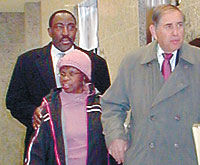In the end,
Clarence Norman’s fall was anti-climactic.
The former head of the Brooklyn Democratic machine and 11-term Assemblyman
— sentenced Wednesday to 2-to-6 years in jail for several campaign
finance violations — simply got up from his defense table and walked,
unhandcuffed, to a holding area to await being sprung hours later for
his appeal.
People in my line of work wait years for a day like Wednesday — a
day when a corrupt politician trades in his charcoal gray suit for something
in a less-flattering blaze orange.
With remorseless machine pols like Norman, you want to hear the jail cell
slam tight like in a Hollywood prison movie. You want to see every member
of his family breaking down in tears while the judge bangs his gavel to
punctuate a lengthy sentence. You want to see a halo-like glow appear
over the head of the prosecutor as he waxes poetic about the sanctity
of the office that the pol has betrayed.
But on Wednesday, something was missing. Indeed, to cite a catchphrase
popular when Norman was first elected in the 1980s, where was the beef?
Earlier this year, a jury found that Norman had solicited a campaign contribution
from a lobbyist above the legal limit and then tried to hide it. And this
fall, a second jury found that Norman had pocketed a check for $5,000
that had been made out to his campaign fund rather than to him.
Both convictions came as part of a wide-ranging investigation by Brooklyn
District Attorney Charles Hynes into whether judgeships were “sold”
in exchange for hiring or paying off Norman cronies.
If true, it’s horrendous. But Hynes hasn’t made that case yet,
although the investigation continues. The best he could do Wednesday was
to trot out prosecutor Michael Vecchione, the chief of his rackets division,
who called Norman “a smarmy and dishonest politician.”
Vecchione’s heart may have been in it, but his oratory never reached
the level of a good courtroom drama.
“I truly believe it’s a sad day … one of the saddest days
in the history of this county,” Vecchione said, clearly forgetting
9/11, the day the Dodgers moved away or the Battle of Long Island. He
called Norman “someone whom everyone in Brooklyn could be proud of
… promising reform and not politics as usual. But we have seen him travel
the road from being a favorite son to a smarmy and dishonest politician.”
Vecchione asked Judge Martin Marcus for a long sentence, citing the ongoing
investigation with which Norman is not cooperating. But the judge refused
to tack on a few years merely on Vecchione’s word that Norman is
“at the heart” of an alleged judicial scandal.
For his part, Norman made a half-hearted apology to his family. And he
also finally admitted that he had betrayed his constituents — but
not because of his conviction, mind you, but because they no longer benefit
from his “23 years of seniority, power and influence.” It will
take his replacement, Karim Camara, “years to deliver for this district,”
Norman said.
And Norman’s lawyer, Ed Rappaport, spoke at length about how his
client was convicted of a “non-violent, victimless crime,” as
if that absolved him of the need to sit in jail for a few years.
He asked for community service rather than hard time, slamming Vecchione
for demanding a five-year sentence.
“I have been involved in cases of murder, sodomy, rapes, but for
a first offender whose crime is not violent, it would be unheard of to
ask for five years,” he said. “I truly don’t understand
what [prosecutors] are trying to do. The punishment has to fit the crime.”
Let the record show that Rappaport did not suggest tar and feathering
or running Norman out of town on a rail — the true punishments that
fit these crimes.
Even Judge Marcus’s sounded bored when he finally pronounced sentence
on Norman. “He well knew the law and was obliged to observe it, but
he willfully, knowing violated it,” said Marcus. “The mechanisms
by which he did so were devious and manipulative. And his explanation
that it was sloppiness, not guile, is unconvincing and shameful.”
Marcus hit Norman with 1-3 years for each conviction and ordered him to
pay $420 in court surcharges and crime victims’ compensation fees.
This last request seemed for a moment to be more onerous to Norman than
the jail time. When it was handed down, the former Brooklyn kingmaker
turned to his long-suffering family in the courtroom and made a face that
indicated he didn’t have that kind of money on him.
One member of the family pulled out a checkbook, but Norman had already
been removed to the holding pen before she had to write the check.

























